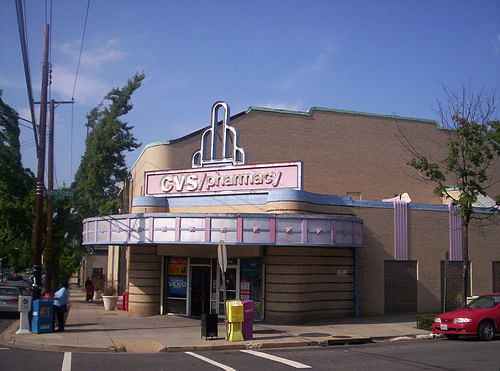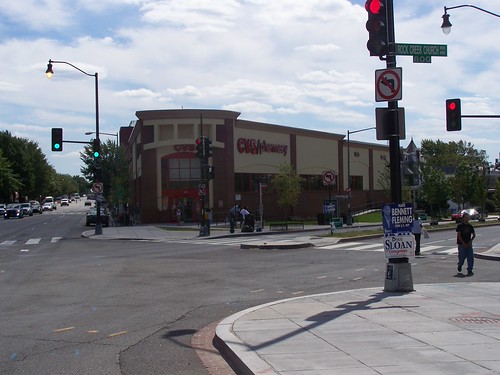For the moment, after the acquisition of the pharmacies in Target discount department stores, CVS is the nation's largest pharmacy retail chain, although this will change if Walgreens is allowed to merge with Rite Aid ("Regulatory Fears Over the Walgreens-Rite Aid Merger," Wall Street Journal).
CVS has been an innovator in terms of broadening its business model to include pharmacy benefits management and its decision about two years ago to stop selling tobacco products ("CVS stops selling tobacco, offers quit-smoking programs," USA Today, finding such sales to be incongruent with a greater focus on health--the company has rebranded as CVS Health ("Behind the CVS Health Rebranding Strategy," HealthLeaders Media).
And in cities, where CVS is heavily represented, at least on the East Coast, the stores also function as convenience stores of a sort (no fountain drinks and coffee program) and those stores have been reorganized to sell more food items, including sandwiches, yogurt, and fruit ("CVS clusters consumables in new urban store concept," Drug Store News).
Chain retailers treat buildings as an element of their brand. Like most retailers, the company long ago developed standard building designs and models as a form of marketing and branding, so that if you see one of these buildings you know its a CVS drug store.
This creates tensions within communities when retailers, including CVS, want to open stores, but not in existing buildings, because the existing building "doesn't communicate the brand."
Ronald Lee Fleming of the Townscape co-authored a book, Saving Face: How Corporate Franchise Design Can Respect Community Identity, on this topic more than 20 years ago, but the issue hasn't gone away. Ed McMahon, now senior fellow at the Urban Land Institute, has addressed this topic extensively over his career (e.g., "The Secrets of Successful Communities – Part 6: Pay Attention to Community Aesthetics").
 This CVS pharmacy in the Brookland neighborhood in DC is located within an old theater, the Newton. The building signage mimics the old theater marquee.
This CVS pharmacy in the Brookland neighborhood in DC is located within an old theater, the Newton. The building signage mimics the old theater marquee.While it is true that CVS and other retailers will open stores in existing even historic buildings, especially in large business districts, for the most part they prefer to clear a site and build one of their standard buildings. (Also see "(Not) Understanding how retail chains make property decisions.")
This is true outside of the core in center cities, even though in DC at least, CVS has an affinity for locating in old theater buildings.
 This CVS is at a major intersection in Northwest Washington, DC, across from a Metrorail station. From an urban design and urbanism standpoint, the building should be multistory. Sadly, despite the failure to achieve better urbanism, the project received city tax abatements. The building is now owned by a REIT.
This CVS is at a major intersection in Northwest Washington, DC, across from a Metrorail station. From an urban design and urbanism standpoint, the building should be multistory. Sadly, despite the failure to achieve better urbanism, the project received city tax abatements. The building is now owned by a REIT.The real estate sector is organized in anti-urbanism ways. One of the problems in getting the CVS or other companies to consider locating in multi-story or more unique buildings that would better serve urbanism has to do with how the real estate industry works with this and other retailer categories.
There are real estate investment trusts that focus on owning sites/buildings for pharmacies, and they aren't interested in anything complicated, like renting space out to more than one tenant ("Problematic outcomes as real estate investment trusts buy more "high street" retail real estate," 2015).
CVS aims to demolish historic building in Strafford, Pennsylvania. According to the Philadelphia Inquirer ("Can Main Line history coexist with a CVS?"), one of the latest examples of CVS aiming to tear down a historic building in favor of one of their cookie cutter stores is in Strafford, Pennsylvania, on Route 30, which is a road that historically has linked Philadelphia and Lancaster.
Covered Wagon Inn was constructed around 1780 as a stopping point for people traveling between Philadelphia and Lancaster. The exterior facade is relatively intact and ties the building to local history as well as the history of transportation, although the interior of the building has long since been modernized.
The Inn is on a corner lot, and CVS wants to replace the building with a new store. There is enough space to build on the lot and keep the Covered Wagon Inn, but not enough to also include a drive-through window--which they see as a must for stores located in automobile-dominated communities.
From the article:
Last month, a Montgomery County developer applied to Tredyffrin Township to raze the structure and put up a CVS pharmacy, with drive-through, on the 1.7-acre tract. The proposal has raised preservationist hackles in Tredyffrin and surrounding areas. More than 3,800 people have signed an online petition asking Ambler-based Summit Realty Advisors to forgo demolition and incorporate the building into its plans for the property.No legal remedies are available. But the community doesn't have strong local historic preservation laws--decisions to preserve buildings are left to the property owner at their discretion--so they can only beg the developer -- and maybe put pressure on CVS -- to change their plans.
The local Community Matters blog has an entry "Covered Wagon Inn, 250 years of Philadelphia’s Main Line History Could Be Demolished: Update Part I," on the matter, with links to Facebook pages, petitions, and other local coverage.
Attempts to save buildings once plans are underway, without any legal remedies in place, generally fail.
It's best to put laws in place before you need them. If communities value their history, they need to take steps to protect it, rather than merely take it for granted.
While DC's preservation law is not perfect, we do have some of the strongest preservation laws in the US. Buildings can be nominated for saving by non-owners, and the decision to protect buildings is made by an independent historic preservation commission, and decisions are not subject to final approval or reversal by either the Executive or Legislative branches of government.
There is also a special process to consider landmark protections for buildings threatened specifically by demolition--it's not a slam dunk, the building has to represent a high level of significance, and it's up to individuals or organizations, not the city, to initiate the process--but it affords the opportunity for retrospective action, which is a remedy not available to historic preservationists concerned about the Covered Wagon Inn.
That being said, DC's preservation laws were first created in response to the demolition of historic properties in the Capitol Hill neighborhood, when it was realized that being listed on "the National Register of Historic Places" only protects buildings "from federal action." And since most actions within the built environment are local, not involving "federal undertakings" (like road projects or urban renewal), local laws are necessary to fully protect historic properties and districts.
This CVS building proposed for New Orleans is identical in design to the store pictured above, located at Georgia and New Hampshire Avenues NW in Washington DC.



CVS Customer Satisfaction Survey: Are you searching for CVS Pharmacy Customer Satisfaction Survey at www.cvssurvey.com/ff information?
ReplyDeleteIf yes, then you have arrived at the right place, cause here in this post we have discussed everything about CVS Customer Satisfaction Survey.
Throughout this survey, you can share your opinions or views about the services based on the new experience at CVS store.
cvs customer feedback
cvs extra care customer service
cvs pharmacy $1000 monthly sweepstakes
My Bali tour with EZGo Travel was an absolute dream come true! From start to finish, they exceeded all my expectations and made sure every moment was truly unforgettable. The itinerary they crafted allowed me to experience the best of Bali's stunning landscapes, vibrant culture, and delicious cuisine.
ReplyDeleteThe knowledgeable guides from EZGo Travel shared fascinating insights about the local traditions and history, adding depth to my journey. Whether I was exploring ancient temples, lounging on pristine beaches, or indulging in mouthwatering Balinese delicacies, every experience was carefully curated to showcase the beauty and richness of the island.
What truly impressed me was the level of personal attention and care provided by EZGo Travel. They anticipated my needs, arranged seamless transportation, and ensured I had the most comfortable accommodations. Their dedication to customer satisfaction made me feel like a valued guest throughout the tour.
If you're planning a trip to Bali, I wholeheartedly recommend EZGo Travel. Their expertise, attention to detail, and genuine passion for creating extraordinary travel experiences will make your journey truly remarkable. Trust me, you'll return home with memories that will last a lifetime!
Blog is really interesting to read out about how CVS aims to demolish 235 year old historic building for drive through window element of a new pharmacy in Pennsylvania. We can install new technologically advance Vacuum Insulated Glass windows, thanks for sharing the blog with us.
ReplyDeleteInteresting blog. Ready to occupy villas in Kakkanad
ReplyDeleteDr. Tony Fernandez eye hospital offers Cataract Surgery Cost in Kochi
ReplyDeleteLourdes hospital provide Best Gynecologist in Ernakulam
ReplyDelete